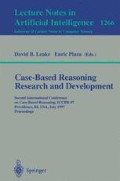Abstract
Planning by analogical reasoning is a learning method that consists of the storage, retrieval, and replay of planning episodes. Planning performance improves with the accumulation and reuse of a library of planning cases. Retrieval is driven by domain-dependent similarity metrics based on planning goals and scenarios. In complex situations with multiple goals, retrieval may find multiple past planning cases that are jointly similar to the new planning situation. This paper presents the issues and implications involved in the replay of multiple planning cases, as opposed to a single one. Multiple case plan replay involves the adaptation and merging of the annotated derivations of the planning cases. Several merge strategies for replay are introduced that can process with various forms of eagerness the differences between the past and new situations and the annotated justifications at the planning cases. In particular, we introduce an effective merging strategy that considers plan step choices especially appropriate for the interleaving of planning and plan execution. We illustrate and discuss the effectiveness of the merging strategies in specific domains.
This research is sponsored as part of the DARPA/RL Knowledge Based Planning and Scheduling Initiative under grant number F30602-95-1-0018. Thanks to Michael Cox and the anonymous reviewers for their comments on this paper.
Preview
Unable to display preview. Download preview PDF.
References
Perry Alexander and Costas Tsatsoulis. Using sub-cases for skeletal planning and partial case reuse. International Journal of Expert Systems Research and Applications, 4–2:221–247, 1991.
Anthony Barrett and Daniel S. Weld. Partial-order planning: Evaluating possible efficiency gains. Artificial Intelligence, 67:71–112, 1994.
Jaime G. Carbonell. Derivational analogy: A theory of reconstructive problem solving and expertise acquisition. In R. S. Michalski, J. G. Carbonell, and T. M. Mitchell, editors, Machine Learning, An Artificial Intelligence Approach, Volume II, pages 371–392. Morgan Kaufman, 1986.
Richard E. Fikes and Nils J. Nilsson. Strips: A new approach to the application of theorem proving to problem solving. Artificial Intelligence, 2:189–208, 1971.
Karen Zita Haigh and Manuela M. Veloso. Route planning by analogy. In Case-Based Reasoning Research and Development, Proceedings of ICCBR-95, pages 169–180. Springer-Verlag, October 1995.
Karen Z. Haigh, Jonathan Shewchuk, and Manuela M. Veloso. Exploring geometry in analogical route planning. To appear in Journal of Experimental and Theoretical Artificial Intelligence, 1997.
Kristian J. Hammond. Case-based Planning: An Integrated Theory of Planning, Learning and Memory. PhD thesis, Yale University, 1986.
Steve Hanks and Dan S. Weld. A domain-independent algorithm for plan adaptation. Journal of Artificial Intelligence Research, 2:319–360, 1995.
Laurie Ihrig and Subbarao Kambhampati. Derivational replay for partial-order planning. In Proceedings of the Twelfth National Conference on Artificial Intelligence, pages 992–997, 1994.
Subbarao Kambhampati and James A. Hendler. A validation based theory of plan modification and reuse. Artificial Intelligence, 55(2–3): 193–258, 1992.
[Kettler et al., 1994] B. P. Kettler, J. A. Hendler, A. W. Andersen, and M. P. Evett. Massively parallel support for case-based planning. IEEE Expert, 2:8–14, 1994.
B. López and E. Plaza. Case-based planning for medical diagnosis. In J. Romorowski and Z. W. Ras, editors, Methodologies for Intelligent Systems (Proceedings of ISMIS'93). Springer Verlag, 1993.
Steven Minton, Craig A. Knoblock, Dan R. Kuokka, Yolanda Gil, Robert L. Joseph, and Jaime G. Carbonell. PRODIGY 2.0: The manual and tutorial. Technical Report CMU-CS-89-146, School of Computer Science, Carnegie Mellon University, 1989.
H/'ector Muñoz-Avila, Juergen Paulokat, and Stefan Wess. Controlling a nonlinear hierarchical planner using case-based reasoning. In Proceedings of the 1994 European Workshop on Case-Based Reasoning, November 1994.
Louise Pryor and Gregg Collins. Cassandra: Planning for contingencies. Technical report, The Institute for the Learning Sciences, Northwestern University, 1992.
Ashwin Ram and Anthony G. Francis. Multi-plan retrieval and adaptation in an experience-based agent. In David B. Leake, editor, Case-Based Reasoning: experiences, lessons, and future directions,pages 167–184. AAAI Press/The MIT Press, 1996.
Michael Redmond. Distributed cases for case-based reasoning; Facilitating the use of multiple cases. In Proceedings of the Eighth National Conference on Artificial Intelligence, pages 304–309, Cambridge, MA, 1990. AAAI Press/The MIT Press.
Barry Smyth and MArk T. Keane. Experiments on adaptationguided retrieval in case-based design. In M. Veloso and Agnar Aamodt, editors, Case-BasedReasoning Research and Development, pages 313–324. Springer Verlag, October 1995.
Peter Stone and Manuela M. Veloso. User-guided interleaving of planning and execution. In New Directions in Al Planning, pages 103–112. IOS Press, 1996.
Manuela M. Veloso and Jim Blythe. Linkability: Examining causal link commitments in partial-order planning. In Proceedings of the Second International Conference on Al Planning Systems, pages 170–175, June 1994.
Manuela M. Veloso and Peter Stone. FLECS: Planning with a flexible commitment strategy. Journal of Artificial Intelligence Research, 3:25–52, 1995.
[Veloso et al., 1995] Manuela M. Veloso, Jaime Carbonell, M. Alicia Pérez, Daniel Borrajo, Eugene Fink, and Jim Blythe. Integrating planning and learning: The PRODIGY architecture. Journal of Experimental and Theoretical Artificial Intelligence, 7(1):81–120, 1995.
Manuela M. Veloso. Planning and Learning by Analogical Reasoning. Springer Verlag, December 1994.
Xuemei Wang and Manuela M. Veloso. Learning planning knowledge by observation and practice. In Proceedings of the ARPA Planning Workshop, pages 285–294, Tucson, AZ, February 1994.
Author information
Authors and Affiliations
Editor information
Rights and permissions
Copyright information
© 1997 Springer-Verlag Berlin Heidelberg
About this paper
Cite this paper
Veloso, M.M. (1997). Merge strategies for multiple case plan replay. In: Leake, D.B., Plaza, E. (eds) Case-Based Reasoning Research and Development. ICCBR 1997. Lecture Notes in Computer Science, vol 1266. Springer, Berlin, Heidelberg. https://doi.org/10.1007/3-540-63233-6_511
Download citation
DOI: https://doi.org/10.1007/3-540-63233-6_511
Published:
Publisher Name: Springer, Berlin, Heidelberg
Print ISBN: 978-3-540-63233-7
Online ISBN: 978-3-540-69238-6
eBook Packages: Springer Book Archive

